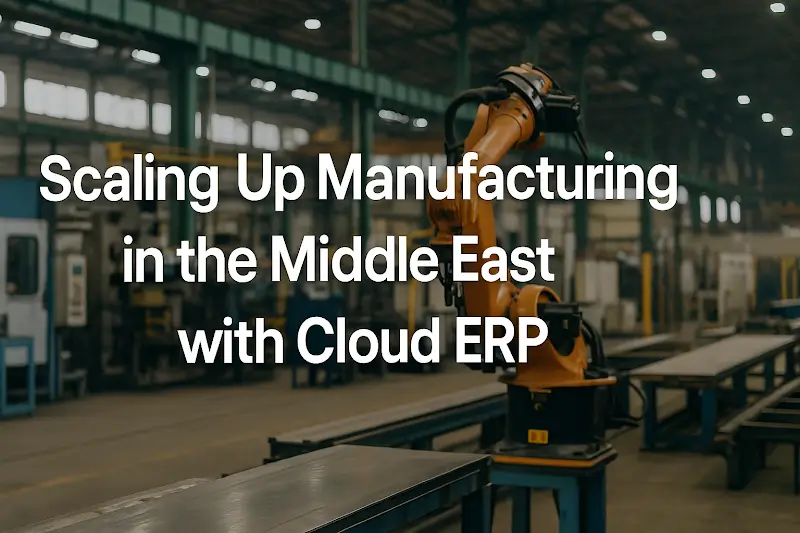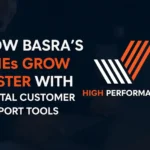The manufacturing landscape across the Middle East is transforming faster than ever. From the industrial zones of Dubai and Abu Dhabi to the production hubs of Basra, factories are realizing that traditional methods can no longer keep up with modern demands. Businesses are looking for smarter ways to manage everything from raw material sourcing to finance and distribution. This is where a reliable ERP Software Provider in Dubai can make a difference — by helping manufacturers move their systems to the cloud and unlock new efficiencies.
Cloud-based ERP (Enterprise Resource Planning) systems are now becoming the backbone of regional manufacturing growth. These platforms simplify complex operations by connecting finance, supply chain, production, and HR under one roof. Instead of managing data in multiple disconnected tools, everything runs in sync, giving decision-makers complete visibility across the entire organization.
1. The Need for Digital Agility in Manufacturing
Middle Eastern manufacturers operate in a highly competitive market — one that demands speed, precision, and flexibility. Yet, many companies still rely on old systems that can’t support rapid decision-making. Finance departments are buried in spreadsheets, production teams struggle with manual reporting, and procurement works in isolation.
This fragmented setup often leads to costly delays, inconsistent data, and missed opportunities. In industries like oil, construction materials, and logistics manufacturing, such gaps can mean the difference between profit and loss.
Cloud ERP changes that by giving every department access to the same real-time data. Whether a factory supervisor in Basra updates production numbers or a finance manager in Dubai checks costs, the system ensures everyone sees accurate, up-to-date information instantly.
2. How Cloud ERP Supports Growth
As companies expand — opening new branches, adding product lines, or serving global markets — their systems must grow with them. A cloud-based ERP scales effortlessly without expensive infrastructure upgrades.
Manufacturers can easily add users, integrate new modules, or connect additional sites without downtime. This flexibility is crucial for the Middle East’s fast-evolving industrial sector, where diversification and regional expansion are key business goals.
Cloud ERP also helps maintain operational consistency across locations. A plant in Fujairah, for instance, can use the same processes and reporting standards as one in Basra, ensuring quality and compliance remain consistent even as the business scales.
3. Strengthening Finance and Operations Integration
One of the biggest advantages of cloud ERP is how it bridges the gap between finance and operations. Every transaction — from raw material purchases to production runs — is automatically linked to financial records.
This real-time integration allows CFOs and plant managers to track costs, monitor profitability, and manage budgets with precision. Financial data no longer lags behind production updates. Instead, both teams collaborate seamlessly, leading to better forecasts and smarter investment decisions.
For companies navigating complex VAT, tax, and compliance rules in the UAE and Iraq, cloud ERP also ensures accurate, audit-ready reporting. It simplifies local regulatory processes while maintaining global accounting standards — a huge relief for finance teams.
4. Collaboration Across the Entire Value Chain
Modern manufacturing doesn’t stop at production. It includes suppliers, logistics providers, distributors, and customers — all working together to deliver value. Cloud ERP enables that collaboration by providing a shared, transparent platform for communication.
Suppliers can update delivery timelines, sales teams can view inventory levels, and management can monitor performance from a single dashboard. This connected approach reduces delays, prevents miscommunication, and ensures everyone stays aligned with company goals.
The result? Faster turnaround times, fewer errors, and a smoother overall workflow — which is vital for maintaining competitiveness in regional markets.
5. The Role of Cloud ERP in Driving Innovation
Innovation in manufacturing is no longer limited to machinery or automation. It’s about data — how quickly you can collect, understand, and act on it. Cloud ERP provides that foundation for innovation by integrating analytics and AI-driven insights into everyday processes.
From predictive maintenance that prevents machine downtime to smart inventory control that reduces waste, cloud ERP enables companies to make decisions backed by real data. It’s not just about keeping up; it’s about staying one step ahead.
In markets like the UAE and Iraq, where government initiatives are pushing for digital transformation, adopting cloud ERP positions manufacturers as forward-thinking leaders ready to embrace the future.
6. Overcoming Implementation Challenges
Transitioning from legacy systems to cloud ERP can seem daunting, but the right strategy makes it achievable. Businesses should start by assessing their current processes, cleaning up existing data, and defining clear goals for the new system.
Change management is equally important. Employees at every level need to understand how the new ERP system benefits them — not just the organization. Training, internal communication, and phased rollouts help ensure a smoother transition.
Working with experienced consultants who understand the regional business environment can also prevent common pitfalls and reduce implementation time. This is where Business Line has earned its reputation for guiding Middle Eastern manufacturers through successful digital transformations.
7. Choosing the Right Partner for Transformation
A successful ERP project is about more than technology — it’s about collaboration. The best outcomes happen when companies partner with experts who not only know the software but also understand local industries, compliance rules, and business culture.
By working with a Top SAP Partner, manufacturers can ensure their ERP solution is tailored to their unique needs, localized for regional requirements, and supported by experts from start to finish. Whether upgrading systems in Abu Dhabi or connecting plants across Iraq, the right partnership ensures every step of the transformation adds measurable value.
Conclusion
The future of manufacturing in the Middle East is digital — driven by real-time data, connected operations, and smarter decision-making. Cloud ERP gives companies the power to scale efficiently, manage complexity, and adapt quickly to changing market needs.
As industries in Basra, Dubai, and across the GCC embrace digital transformation, investing in cloud ERP isn’t just a technical upgrade — it’s a strategic move toward long-term growth and competitiveness.






